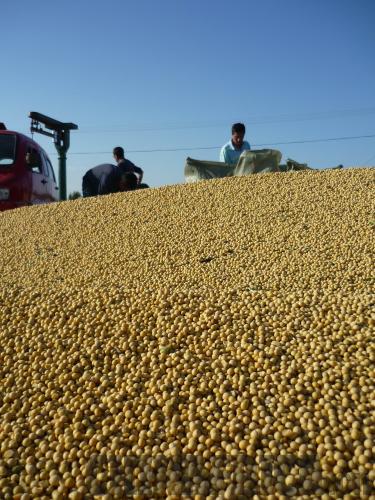|
|

|
|
Non-GM soybean in Heilongjiang Province (ZHOU LIANGJUN) |
When Beijing resident Xie Hongzhen visits her rural hometown in Jiangsu Province every year, the top item on her list of things to take back to Beijing with her is cooking oil, as many bottles as she can carry.
"It's safe for me to eat oil made from soybeans grown by my parents in my hometown," said Xie. "I don't trust the soybean oil sold in the supermarkets in Beijing as it is mainly made from genetically modified (GM) soybeans."
The jury is still out on the safety of GM crops, and public debate on the topic has flourished in China. "Many experts say there is no evidence showing GM food will harm people's health, but who knows?" said Xie. "So, I will do my best to avoid such foods, for my own safety and that of my family."
It is now difficult to find non-GM soybean oil in China's supermarkets, as almost 90 percent of the soybean oil found in the nation's supermarkets is made from GM soybeans, according to the Heilongjiang Soybean Association.
Consumers wary
Public concerns about GM crops grew on June 13, when China's Ministry of Agriculture issued bio-safety certificates to three new overseas varieties of GM soybeans, allowing them to be imported as raw materials for domestic processing.
While GM seed providers, like the U.S.-based Monsanto, breathed a sigh of relief at being granted this chance to enter China's huge market, Chinese consumers are holding their collective breath, concerned about what the rise of GM food will bring.
According to a public poll on sina.com.cn, China's largest Internet portal website, after the Ministry of Agriculture's soybean announcement, about 77.7 percent of the respondents said they believed that GM foods are harmful to people's health, while 86.5 percent clearly indicated that they would not buy GM foods.
"Actually, China was very cautious in evaluating the safety of the three varieties of GM soybeans," said Peng Yufa, Deputy Director of the National Transgenic Crop Committee, at a press conference on June 14. He noted that it took the Agriculture Ministry three years to approve their application, and during this period, repeated evaluations had been made.
Also, the cooking oil made from the imported soybeans does not contain transgenic proteins, he said. "So, there will be no food safety threat."
But Peng's explanation failed to ease people's concerns. In late June, Wang Xiaoyu, Deputy Secretary General of Heilongjiang Soybean Association, asserted that GM soybeans may cause cancer as his studies indicate that the regions where people mainly consume GM soybeans are also home to the highest number of cancer patients. Though many experts argue that his claim is baseless, Chinese consumers are still wary of GM foods.
"This issue [the safety of GM crops] is being debated in academic circles and no one has come up with sufficient evidence showing whether or not it is safe," Chen Xiwen, Deputy Head of Central Rural Work Leading Group told ChinAfrica. "But as far as I know, there have been no cases where eating GM foods has harmed people's health."
|